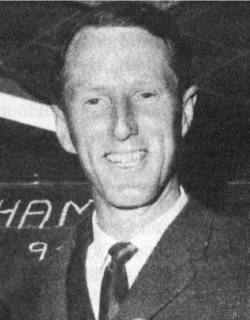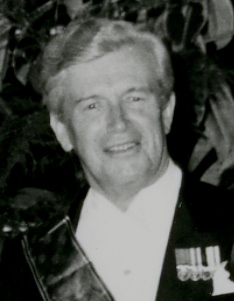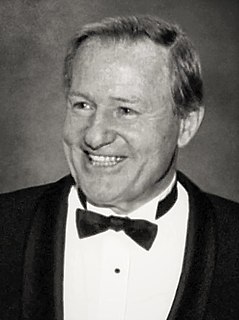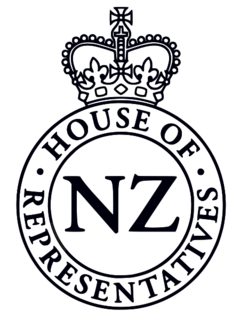
Sir Keith Jacka Holyoake was the 26th Prime Minister of New Zealand, serving for a brief period in 1957 and then from 1960 to 1972, and also the 13th Governor-General of New Zealand, serving from 1977 to 1980. He is the only New Zealand politician to date to have held both positions.

Sir John Ross Marshall, generally known as Jack Marshall, was a New Zealand politician of the National Party. He entered Parliament in 1946 and was first promoted to Cabinet in 1951. After spending twelve years as Deputy Prime Minister, he served as the 28th Prime Minister for most of 1972.

The New Zealand Party operated as a political party in New Zealand from 1983 to about 1986. Established by millionaire property tycoon Bob Jones, the party promoted economic liberalisation—it was the first political party to promote free market reforms. It failed to win any seats in Parliament, but it purportedly played a role in causing the defeat of Robert Muldoon's National government in the 1984 election by splitting the vote.

Sir James Kenneth McLay is a New Zealand diplomat and former politician. He served as the Deputy Prime Minister from 15 March to 26 July 1984. McLay was also Leader of the National Party and Leader of the Opposition from 29 November 1984 to 26 March 1986. Following his ousting as party leader, he retired from parliamentary politics in 1987. In June 2009, he became New Zealand's Permanent Representative to the United Nations. In May 2015, McLay became New Zealand's Representative to the Palestinian Authority. From May 2016 to January 2017, he was New Zealand's Consul General in Honolulu.

Derek Francis Quigley is a former New Zealand politician. He was a prominent member of the National Party during the late 1970s and early 1980s, and was known for his support of free market economics and trade liberalisation. Quigley left the National Party after clashing with its leadership, and later co-founded the ACT party.

Sir Brian Edward Talboys was a New Zealand politician who served as Deputy Prime Minister for the first two terms of Robert Muldoon's premiership. If the abortive "Colonels' Coup" against Muldoon had been successful, Talboys would have become Prime Minister himself.

The 1975 New Zealand general election was held on 29 November to elect MPs to the 38th session of the New Zealand Parliament. It was the first general election in New Zealand where 18- to 20-year-olds and all permanent residents of New Zealand were eligible to vote, although only citizens were able to be elected.

The New Zealand Young Nationals, more commonly called the Young Nats, is the youth wing of the New Zealand National Party, a centre-right political party in New Zealand, and a member of the International Young Democrat Union.
The East Coast Bays by-election of 1980 was a by-election during the 39th New Zealand Parliament in the East Coast Bays electorate. It resulted in an upset for the National Party, as their candidate and future leader Don Brash was unexpectedly beaten by Gary Knapp of the Social Credit Party.

Brigadier Duncan MacIntyre was a New Zealand politician of the National Party. He served as Deputy Prime Minister from 1981 to 1984 under Prime Minister Robert Muldoon.
New Zealand political leader Jim McLay assembled a "shadow cabinet" system amongst the National caucus following his election to the position of Leader of the Opposition in 1984. He composed this of individuals who acted for the party as spokespeople in assigned roles while he was Leader of the Opposition (1984–86). McLay was plagued by interference from previous leader Robert Muldoon, who was denied a place on National's frontbench which he desired, unlike McLay who wished him to retire to the backbenches as an 'elder statesmen'.

The New Zealand National Party leadership election, 1940 was held to determine the future leadership of the New Zealand National Party. The election was won by Christchurch North MP Sidney Holland.

The New Zealand National Party leadership election was held to determine the leadership of the New Zealand National Party. The election was won by Karori MP Jack Marshall.

The New Zealand National Party leadership election was held to determine the future leadership of the New Zealand National Party. The election was won by Tamaki MP Robert Muldoon.

The New Zealand National Party leadership election, 1984 was held to determine the future leadership of the New Zealand National Party. The election was won by former Deputy Prime Minister Jim McLay.
New Zealand political leader Jim Bolger assembled a "shadow cabinet" within the National Party caucus after his election to the position of Leader of the Opposition in 1986. He composed this of individuals who acted for the party as spokespeople in assigned roles while he was Leader of the Opposition (1986–90).

The New Zealand National Party leadership election was an election for the National leadership position in 1986.
Barry Selwyn Gustafson is a New Zealand political scientist and historian, and a leading political biographer. He served for nearly four decades as Professor of Political Studies at the University of Auckland, and as Acting Director of the New Zealand Asia Institute from 2004 to 2006. He has contested various general elections, first for the Labour Party and later for the National Party, coming second each time.

The International Standard Book Number (ISBN) is a numeric commercial book identifier which is intended to be unique. Publishers purchase ISBNs from an affiliate of the International ISBN Agency.

















